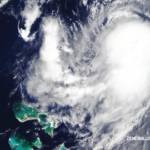“After Katrina, it took months—years, in some cases—to reestablish the financial and postal connections,” Dahl notes.
Although business interruption insurance saved some practices in New Orleans following Katrina, some physicians who didn’t pay themselves a salary after the hurricane negated their policies.
Back Up Critical Documents
Ensure that you’ll have access to patient and financial information if your physical plant is damaged or destroyed. Secure a copy of the network schematic of your hardware, as well as software disks and documentation, so you can restore the system if your network crashes, Hertz suggests.
Back up your electronic medical record (EMR) or clinical and billing data at least weekly—preferably daily—and store the information on a remote server, preferably in another state. An on-site server or backup tapes will be of no value if your practice burns to the ground or washes away.
Dr. Feldman’s practice did not use an EMR prior to Katrina. Afterwards, “literally, everything was gone,” she says. “I’m still getting Social Security disability requests for those records, and they just don’t exist.”
Dr. Feldman also recommends the creation of what she calls a “Flight File”—a compilation of insurance policies, service contracts, leases, warranties, patient records, vendor contacts, and other vital documents containing information that would enable the practice to remain solvent and rebuild in the event of a total loss (see Table 1). Store copies of these documents offsite, either in hard copy or on a flash drive, and update them quarterly, she suggests. Develop a chain of command for transporting the original Flight File in a waterproof, fireproof box in the event of an emergency.
“If you prepare a Flight File and keep a copy offsite, you’ll have the basics with you,” Dr. Feldman says. “When you lose everything and you’re in survival mode, you need every piece of information at your fingertips so you don’t have to try to remember details.”
Once your disaster plan is complete, laminate copies of the basic steps and place the template throughout your office, including the physician and staff lounges, so the information becomes ingrained.
Finally, purchase business interruption insurance to cover your operating profit, salaries, and fixed expenses if your operations are curtailed or suspended during an insured loss. A rider called “extra expense coverage” would pay for the cost of rental space, enabling your practice to remain whole following the loss.
Like most insurance policies, business interruption insurance may include a waiting period, deductible, and limitations based on how the policy defines a disaster. Read the fine print. Although business interruption insurance saved some practices in New Orleans following Katrina, some physicians who didn’t pay themselves a salary after the hurricane negated their policies.


